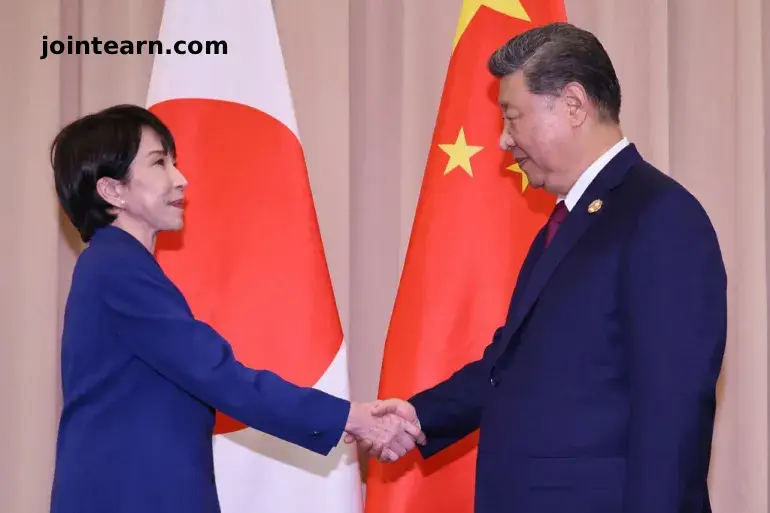
China has issued an urgent travel advisory urging its citizens to avoid Japan, escalating an already volatile diplomatic feud sparked by comments from newly elected Japanese Prime Minister Sanae Takaichi regarding potential military involvement in Taiwan. The warning marks the latest development in the deteriorating relations between Asia’s two largest powers.
Rising Tensions Over Taiwan Security
The dispute began after Prime Minister Takaichi told Japan’s parliament on November 7 that Tokyo may deploy military forces if China launches an attack on Taiwan — a self-ruled island that Beijing claims as its own territory.
Her remarks were seen by China as a direct provocation. Beijing responded sharply, summoning Japan’s ambassador and publicly condemning Tokyo for interfering in its “internal affairs”. Japan later summoned the Chinese ambassador as well, after a controversial social media post by a Chinese consul general in Osaka appeared to threaten Takaichi personally. The post, which caused public outrage, has since been deleted.
Despite the diplomatic uproar, Tokyo insists its long-standing position remains unchanged: Japan views the stability of Taiwan — located just 110km (70 miles) from its nearest island — as vital to national and regional security.
China Warns Citizens: “Do Not Travel to Japan”
On Friday, China’s embassy in Japan posted an official advisory on WeChat urging citizens to postpone any travel plans to Japan.
The statement claimed that recent remarks by Japanese leaders had “blatantly provoked China over Taiwan”, creating an unsafe climate for Chinese citizens living in or travelling to Japan. It added that the situation poses “significant personal safety risks.”
“The Ministry of Foreign Affairs and the Chinese embassy and consulates in Japan solemnly remind Chinese citizens to avoid travelling to Japan in the near future,” the advisory stated.
In response, Japan’s Chief Cabinet Secretary Minoru Kihara said Beijing’s warning was “inconsistent with efforts to build a mutually beneficial strategic relationship.” Japan has requested China to take “appropriate measures” to prevent the situation from escalating further.
Chinese Airlines Cancel and Refund Japan Routes
A day after the announcement, China’s three largest airlines — Air China, China Southern Airlines, and China Eastern Airlines — issued coordinated statements offering full refunds and free itinerary changes for all flights to Japan through December 31.
The widespread refund policy indicates that China is prepared to take additional economic and travel-related measures as tensions continue to unfold.
Broader Geopolitical Implications
The dispute highlights the fragile equilibrium in East Asia, where historical grievances, territorial claims, and rising military spending regularly strain Sino-Japanese relations. Although the two countries maintain strong economic ties, mistrust regarding regional dominance persists.
China maintains that Taiwan is an inseparable part of its territory and has not ruled out the use of force to achieve reunification. Japan, meanwhile, has traditionally adopted a policy of “strategic ambiguity”, avoiding explicit references to Taiwan’s defense — a stance aligned with the United States, its key security ally.
Prime Minister Takaichi’s explicit remarks mark a notable shift in Japan’s messaging and suggest a more assertive posture toward regional security.
Taiwan Responds to Rising Tensions
Taiwan’s Presidential Office spokesperson, Karen Kuo, said that China’s travel restrictions and recent live-fire drills have heightened concerns about regional security.
She stated that Beijing’s “politically motivated and multifaceted threats” toward Japan pose a serious risk to peace and stability in the Indo-Pacific region.
Meanwhile, China’s Maritime Safety Administration announced that live-fire exercises will be conducted in the central Yellow Sea on Monday and Tuesday, with entry to designated areas prohibited. Chinese state media did not specify detailed coordinates.
A Turning Point in Japan–China Relations?
The combination of military rhetoric, travel warnings, airline cancellations, and diplomatic summoning on both sides indicates that the dispute may become a defining moment in Japan–China relations under Prime Minister Takaichi’s leadership.
As both countries prepare for further political and military moves, the international community is closely watching whether the situation will escalate or stabilize.


Leave a Reply